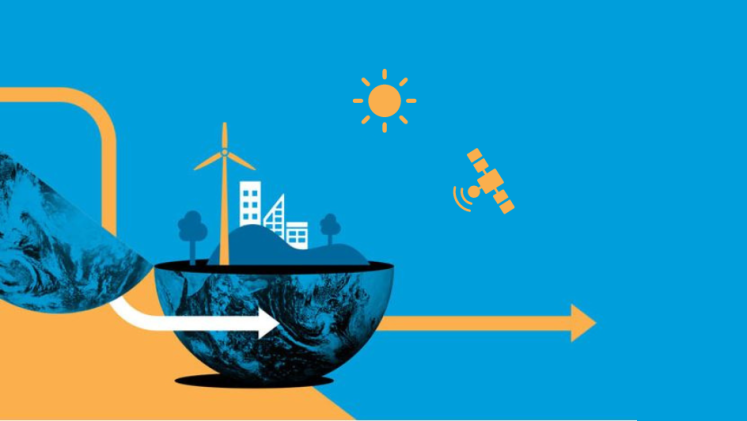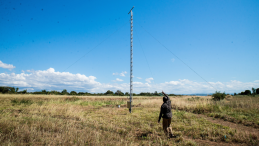United Nations Secretary-General Antonio Guterres identified two issues that require top priority from global leaders and international action: the climate crisis and unchecked development of Artificial Intelligence (AI) technology. Unpacking relevant governance challenges and discussing a way forward for international policymaking at the intersection of AI and climate were the focus of the recent Bonn AI Climate Expert Meeting . This Perspective article builds on some of the discussions.
Can the emerging global AI governance be harnessed for the climate?
In 2023, the United Nations Secretary-General announced the creation of the AI Advisory Body, a committee of 38 experts that produced recommendations on the global governance of AI. They focused on three areas of work: how to mitigate AI risks, how to harness its opportunities – especially in developing countries – and what form global governance efforts should take. This work came in parallel with many initiatives in AI governance, such as the UK AI Safety Summit in 2023, G7 and G20 work on AI governance and AI for the Sustainable Development Goals, as well as international cooperation work by OECD, the Global Partnership on AI (GPAI), the International Telecommunication Union (ITU) and many others.
Considerations from the AI Advisory Body were added to the Global Digital Compact (GDC), which is currently being negotiated as a non-binding multi-stakeholder pact on global digital governance. The ambition of the GDC is to close digital divides, promote inclusive digital economies, ensure safe and human rights-respecting digital spaces, advance equitable data governance, and enhance international AI and emerging technology governance. While climate change is not referenced at the level of strategic objectives, the document itself has several linkages to the Sustainable Development Goals including Goal 13 on climate action.
In the current public version of the GDC (Version 3), there are two primary recommendations on global AI governance: the creation of an International Scientific Panel on AI (ISP) and commitment to an annual dialogue on AI Governance at the UN. There may also be additional commitments made by Member States on capacity-building, as we have seen by the joint G7-UNDP AI Hub for Sustainable Development.
Sign-posting AI climate action
These initiatives hold potential for climate action if they are harnessed intentionally. For instance, an International Scientific Panel on AI could publish regular reports on the risks and opportunities of AI, which could include carbon and water footprints of large language models, for example, as well as use cases in energy optimization, agricultural efficiency and remote sensing of climate impacts. Another promising initiative would be the use of AI for predictive analytics in order to better prepare for storms and floods, which has been discussed following recent increases in climate-related disasters in the Caribbean and South Asia. The Scientific Panel could also become an authoritative voice in broadly assessing AI’s impact on emissions and its role in sustainability transformations, and recommend relevant policy options.
The United Nations Framework Convention on Climate Change (UNFCCC) has specific provisions to promote the development and transfer of climate technologies, and a mechanism including a constituted policy arm (UNFCCC Technology Executive Committee) and a capacity building/implementation arm (Climate Technology Centre and Networks). Since COP 28 in 2023, the UNFCCC has an explicit mandate and work plan to look at AI-related opportunities for climate action as well as risks, especially in least developed and small island states.
The upcoming COP29 in Azerbaijan in November will include discussions on AI for climate action. The opportunity for policymakers exists to connect more explicitly the climate issue to the emerging Global AI Governance framework. Specifically, Member States will debate on mechanisms to monitor and mitigate AI risks and multilateral initiatives to foster AI for the attainment of the SDGs. Consideration should be placed on how AI might adversely impact climate change, and, conversely, how multilateral projects for AI development might promote new efforts in AI for climate action.
Where it matters: local and national AI climate action
One area of convergence could be the promotion of local AI ecosystems to harness climate action. Local AI ecosystems exist throughout the Global South, for example in Indonesia, South Africa and Brazil. These involve many different stakeholders, including local governments, AI start-ups, venture capital firms and academic institutions. Often, these ecosystems are bolstered by national AI strategies – increasingly so also in low-income countries. This development includes the opportunity to more explicitly garner policy strategies on AI and climate, and for example include it in the UNFCCC Technological Needs Assessments, or in the upcoming revision in 2025 of the Nationally Determined Contribution that details countries’ climate actions.
AI ecosystems in developing countries should be bolstered, financially or otherwise, by the international community, in order to develop long-lasting and regionally appropriate AI solutions for climate change.
This article features key insights from the session "Data, Ethics and AI Governance" of the Bonn AI Climate Expert Meeting.





